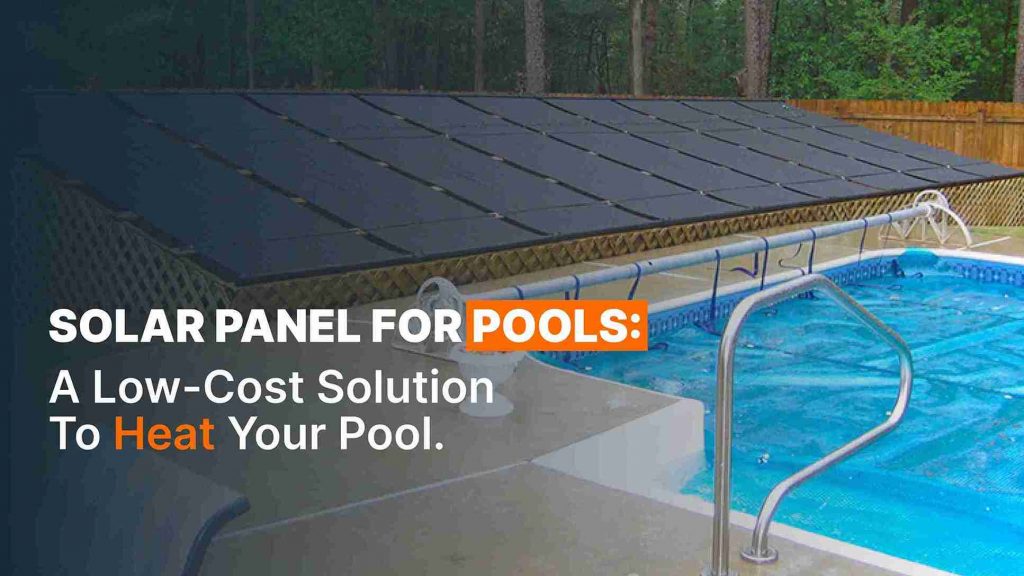Could you warm up your pool with your solar panel? It’s actually very possible, and it’s probably going to save a lot of money compared to the usual pool heating costs. So, if it’s your first time heating up your swimming pool, making it a more comfortable place to swim in all weather, or if you want to reduce heating costs and use your solar panels more efficiently, this knowledge will help you.
Solar Panels For Pool
The cost of pool solar panels could range between $1,500 and $8,000. Solar pool heaters are much more affordable options than regular heating systems. This investment should look great, as you will see your energy bill savings.
First, let’s see how this works. Pool water is pumped out through a filter and into a solar thermal collector, which is heated by solar energy before being returned to the pool. Solar thermal collectors, like solar panels, use the thermal energy from the sun’s exposure.
The system includes a check valve, flow control valve, and sensor to maintain the desired temperature. Most systems automatically detect the water temperature and send it to the solar collector, which heats the water before sending it back to the pool. When the desired temperature is reached, the flow control valve diverts the water directly back to the pool.
In colder parts of the U.S. or in areas where pools are used year-round, the solar collector is usually oversized to ensure it continues heating the pool even during significant temperature drops.
A solar water heater can also work in combination with gas or electric heaters for additional heating if needed.
Let’s take a more in-depth look at solar thermal collectors. After solar thermal collectors capture the sun’s thermal energy, cool water is pumped through the collectors at the bottom, and as it absorbs heat from the sun, it rises to the top, ready to be used to warm pool water.
There are primarily two types of solar thermal collectors: glazed and unglazed.
Glazed Solar Panels:
Also known as flat-plate solar collectors, glazed solar collectors are encased in glass and have a more complex design, made from metals like copper tubing and aluminum plate under an iron-tempered glass cover. These pool solar panels are highly efficient at heating water and require less space, providing higher levels of heat. While solar panels for pools offer year-round use, they come at a higher cost compared to unglazed models. However, they are ideal for swimming pool solar panels due to their superior heating performance.
Unglazed Solar Collectors:
Unglazed solar collectors are made with black plastic or heavy-duty rubber and are treated with ultraviolet (UV) coatings to extend their service life. Unglazed solar collectors are typically cheaper, but they are also less effective and limited to warmer climates and pools whose temperatures don’t reach below freezing. If you live in a state that tends to be on the warmer side, this shouldn’t matter to you.
The significant investment here is the solar collector, so you need to figure out which one is the best for your house. This depends on how many months out of the year you plan to use your pool and how warm you prefer your water to be. The Department of Energy (DOE) recommends that the solar collector be between 50% and 100% of the square footage size of the pool’s surface. So, for a pool measuring 15-by-20 feet with 300 square feet of surface area, the solar collector should be between 150 and 300 square feet in size. If you are looking to keep your pool open throughout the whole year, the solar collector should be at least the size of the pool or larger.
Why Consider Making the Switch?
We already mentioned that the energy bills saved from a system like this will outweigh the initial cost. But there’s more. These systems require very little maintenance compared to gas or electric-powered heating systems. The only upkeep required is to ensure the solar collectors are clean so they can capture as much sunlight as possible.
The biggest benefit of pool solar panels is that they don’t require additional energy inputs to operate. You won’t need to worry about paying for gas or electricity to heat your pool. Simply harness the free sunshine that hits your roof with solar panels for pools or a swimming pool solar panel, and enjoy cost-free heating.
Taking simple steps, like using a pool cover to retain heat, can significantly reduce the costs of running a solar-powered pool heater. Solar pool covers are designed to absorb more thermal energy from the sun and transfer it to the pool surface, enhancing the efficiency of pool solar panels.
Since installing a swimming pool solar panel system involves both electrical and plumbing work, it’s best to contact a professional contractor, especially if you plan to install the system on your roof. A professional can ensure the proper installation of solar panels for pools for optimal performance.

